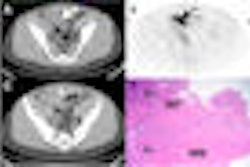Belgian radiopharmaceutical firm Trasis has developed a "minifluidic" chip designed for the multiple step radiochemical synthesis of fluorine-18 (F-18) fluorodeoxyglucose (FDG).
The process includes the extraction of F-18 fluorides and their transfer to dry acetonitrile (ACN), labeling, hydrolysis, final purification, and formulation. The dimensions of the minifluidic chip are 90 x 80 x 5 mm, which makes the actuation setup (synthesizer) very compact. It integrates and combines fluidic functions, i.e., valves, pumps, solid phase extraction (SPE), and built-in reagents, with new and specific methods for the phase transfer of the F-18 fluorides from target water to a dry organic solution without the time-consuming azeotropic evaporation step.
Reagents and SPE phases are loaded in the minifluidic chip prior to the synthesis while the solvents (ACN, water, buffer) are stored in vials outside the chip. FDG, used as a benchmark, has been synthesized along this method on single-use miniaturized instruments. The phase transfer of F-18 fluorides, as produced from the irradiation of oxygen-18-enriched water, from target water (3 mL) to ACN has been performed with reproducible yield of greater than 95% within two minutes without evaporation.
This new range of disposables allows the complete implementation of nucleophilic substitution-based radiopharmaceutical synthesis processes with high radiochemical yield. It is appropriate for mass production at an affordable price, according to Trasis of Embourg.
Copyright © 2009 AuntMinnie.com



















